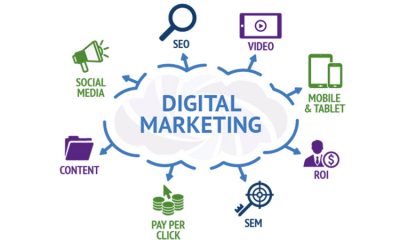Technology
AI and Web Development: The Unexpected Partnership That’s Changing Everything

By eTraverse
That’s Changing Everything
Imagine a web development company that employs Artificial Intelligence (AI) to produce a completely personalized website in a matter of minutes rather than months. That is the real power of AI for web development.
Artificial intelligence technologies have allowed companies like Wix to generate websites 50% faster, and website developers are now able to reduce coding time by up to 40% with the use of AI tools. In addition to increasing user engagement, these developments in website design and development are also establishing new benchmarks for effectiveness and security.
In this blog, we dive into how AI is transforming web development, offering real-world examples, and compelling metrics.
The Evolution of Web Development
Over time, web development has undergone significant change. Static HTML pages were used in the early development of websites, providing little to no interactivity. With the advent of dynamic web apps, websites could become more interactive and visually appealing thanks to JavaScript, CSS, and HTML5.
Rich, dynamic user experiences replaced static material as of this change. To ensure that websites function flawlessly across all devices and screen sizes, responsive design and sophisticated structures are now the main focuses of current web development.
Web interactions are now more seamless and intuitive than ever thanks to these developments, which have raised the bar for website design and development.
The Emergence and Growth of AI
From a theoretical concept, AI has developed into a potent instrument that is revolutionizing the industry. AI first concentrated on developing computers with intelligence like that of humans.
Important turning points include deep learning, that utilizes neural networks to analyse complex data, and machine learning, where algorithms learn from data. Automated language comprehension is made possible by Natural Language Processing (NLP).
Sectors such as healthcare (AI-driven tools have improved diagnostic accuracy by 20%) and finance (AI forecasts market movements with 90% accuracy) have been transformed by these breakthroughs. AI is currently improving website design and development and changing web development.
AI technologies, for instance, can increase user engagement by 35% and speed up coding by 50%. AI has a significant impact on web development and is establishing new benchmarks for productivity and creativity.
AI’s Impact on Web Development
Enhanced User Experience (UX)
User experience (UX) has been completely transformed by AI thanks to its highly tailored and natural interactions. With AI algorithms analyzing user data to provide recommendations and information that is specifically catered to, personalization is at the forefront.
For instance, AI is used by e-commerce giants like Amazon and Netflix to recommend movies and goods to consumers based on their past interactions, making the user experience more relevant and engaging. Because material is tailored to each user’s tastes, this personalized approach can boost user happiness and retention.
Virtual assistants and chatbots are further important applications of AI in UX. These AI-powered solutions effectively respond to consumer questions and support requests while offering immediate help. For example, Sephora’s chatbot improves the overall shopping experience by assisting customers with product discovery and appointment scheduling.
Virtual assistants, such as those powered by AI like Google Assistant and Siri, offer hands-free interaction and seamless integration into daily activities, improving user convenience and engagement.
Automated Coding and Development Tools
Artificial Intelligence (AI) has brought strong tools to the field of automated coding and development that simplify the coding process. Code generation and code management are being revolutionized by AI-powered solutions like GitHub Copilot and code generators.
For instance, GitHub Copilot uses AI to automate repetitive operations and provide code snippets, freeing up developers to work on more intricate project components. This results in more effective and dependable development by cutting down on coding time by up to 40% and lowering the possibility of errors.
Because these technologies provide standard coding methods and minimize the need for intensive manual testing, they help improve developer collaboration. AI incorporation into development workflows increases code quality and speeds up project completion.
SEO and Content Optimization
Significant advancements in SEO and content optimization have also been made by AI. Large volumes of data are analyzed by AI-driven SEO technologies to improve website visibility and ranking by optimizing content for search engines.
AI is used by programs like Clearscope and MarketMuse to assess the relevance of material and offer recommendations that can be implemented. By using a data-driven strategy, material may be made to comply with SEO guidelines and increase organic traffic.
Predictive analytics is also essential for performance monitoring and content production.
Businesses can create content strategies that are in line with future demands thanks to AI algorithms that predict trends and consumer preferences. This proactive strategy aids in sustaining high levels of engagement and adjusting to shifting market dynamics.
Web Security
AI has a significant impact on web security since it provides cutting-edge methods for detecting and reducing security risks. Real-time pattern analysis and anomaly detection capabilities of AI systems enable them to provide early alerts of possible security breaches. To improve overall security, for example, systems such as Darktrace employ AI to monitor network traffic and spot anomalous activity.
Artificial intelligence (AI) further improves automated security testing and vulnerability assessments, enabling ongoing system and web application evaluation. This keeps sensitive data protected and the internet ecosystem secure by guaranteeing that any vulnerabilities are fixed quickly.
Case Studies and Real-World Examples
Websites and apps with artificial intelligence (AI) enhancements are demonstrating the revolutionary potential of AI in web development. Wix’s Artificial Design Intelligence (ADI) is one notable example. Wix ADI employs artificial intelligence (AI) to generate personalized websites by assessing user preferences and content requirements. With this technology, the process of creating a website has been greatly expedited. Development time has been reduced by 50%, enabling enterprises to launch a polished website more rapidly.
Adobe Sensei, an AI and machine learning platform incorporated within Adobe’s toolkit, is another well-known example. Adobe Sensei improves the creation of websites by offering predictive content, automated tagging, and sophisticated image recognition.
For example, Adobe Sensei’s AI-driven solutions can assess user behavior patterns and streamline content distribution, leading to a 30% rise in user engagement and happiness on platforms that make use of these capabilities.
Success examples demonstrate how AI in web development has real benefits. eBay has introduced AI-powered visual search features that let consumers look for products by utilizing photos rather than text. Conversion rates have grown by 20% and user engagement has improved because of this functionality. Shopify’s use of AI to provide tailored product recommendations has increased sales for its merchants by 35%.
These illustrations show how businesses are using AI to improve user experiences, expedite the development process, and produce quantifiable commercial results. The application of AI in web development is becoming more and more important as it makes digital experiences more effective, customized, and interesting.
Challenges and Considerations
AI ethical considerations include biases in AI and data privacy. Keeping people’s trust requires protecting user data while avoiding biased results. AI dependence raises questions regarding dependence, as it may result in job displacement and less supervision from humans.
Technical challenges also include the potentially difficult and resource-intensive integration of AI with current web frameworks and technologies.
Ethical and efficient web development requires striking a balance between these factors and the advantages of artificial intelligence. By addressing these issues, we can minimize any potential negative effects and ensure that AI breakthroughs have a good impact.
AI and Web Development’s Future
Forecasts and patterns indicate that artificial intelligence (AI) will have a greater impact on web development in the future, propelling advancements in automation and user experience.
Website user and device interactions will change because of emerging technologies like AI in AR/VR and IoT, which will provide more connected and immersive experiences. To remain competitive, web developers of the future will need to combine their traditional talents with AI knowledge. It will be essential to master both traditional web development methods and AI technologies in order to create cutting-edge, intelligent web solutions and adjust to changing industry demands.
eTraverse’s Competency in Using AI for Web Development
eTraverse excels in harnessing AI to elevate web development. Leveraging AI, eTraverse enhances website design and development through advanced tools like AI-driven personalization and automated coding solutions.
Our use of machine learning and predictive analytics optimizes user experiences, delivering tailored content and recommendations. With a focus on integrating AI with existing web frameworks, eTraverse ensures seamless, cutting-edge solutions.
Our expertise extends to AI-enhanced SEO and web security, providing comprehensive, data-driven strategies that drive business growth and efficiency. eTraverse’s innovative approach positions them as a leader in AI-powered web development.
Conclusion
With automation, security, and user experience previously unheard of, the industry is being revolutionized by the incorporation of Artificial Intelligence (AI) into web development. Artificial intelligence (AI) technologies, such as deep learning, machine learning, and Natural Language Processing (NLP), are changing the way websites are created, built, and optimized.
Leading companies, such as eTraverse, are utilizing artificial intelligence (AI) to provide creative solutions that improve website performance and user engagement. Accepting AI simplifies development procedures and creates new opportunities for intelligent, safe, and adaptable web experiences. The revolutionary potential of AI promises a bright future for web development.
Technology
Telecom Operators to Issue 14-Day Notice Before SIM Disconnection

By Adedapo Adesanya
Telecommunications operators in Nigeria will now be required to give subscribers a minimum of 14 days’ notice before deactivating their SIM cards over inactivity or post-paid churn, following a fresh proposal by the Nigerian Communications Commission (NCC).
The proposal is contained in a consultation paper, signed by the Executive Vice Chairman and Chief Executive Officer of the NCC, Mr Aminu Maida, and titled Stakeholders Consultation Process for the Telecoms Identity Risks Management Platform, dated February 26, 2026, and published on the Commission’s website.
Under the proposed amendments to the Quality-of-Service (QoS) Business Rules, the Commission said operators must notify affected subscribers ahead of any planned churn.
“Prior to churning of a post-paid line, the Operator shall send a notification to the affected subscriber through an alternative line or an email on the pending churning of his line,” the document stated.
It added that “this notification shall be sent at least 14 days before the final date for the churn of the number.”
A similar provision was proposed for prepaid subscribers. According to the Commission, operators must equally notify prepaid customers via an alternative line or email at least 14 days before the final churn date.
Currently, under Section 2.3.1 of the QoS Business Rules, a subscriber’s line may be deactivated if it has not been used for six months for a revenue-generating event. If the inactivity persists for another six months, the subscriber risks losing the number entirely, except in cases of proven network-related faults.
The new proposal is part of a broader regulatory review tied to the rollout of the Telecoms Identity Risk Management System (TIRMS), a cross-sector platform designed to curb fraud linked to recycled, swapped and barred mobile numbers.
The NCC explained in the background section of the paper that TIRMS is a secure, regulatory-backed platform that helps prevent fraud stemming from churned, swapped, barred Mobile Station International Subscriber Directory Numbers in Nigeria.
It said this platform will provide a uniform approach for all sectors in relation to the integrity and utilisation of registered MSISDNs on the Nigerian Communications network.
In addition to the 14-day notice requirement, the Commission also proposed that operators must submit details of all churned numbers to TIRMS within seven days of completing the churn process, strengthening oversight and accountability in the system.
The consultation process, which the Commission said is in line with Section 58 of the Nigerian Communications Act 2003, will remain open for 21 days from the date of publication. Stakeholders are expected to submit their comments on or before March 20, 2026.
Technology
Silverbird Honours Interswitch’s Elegbe for Nigeria’s Digital Payments Revolution

By Modupe Gbadeyanka
The founder of Interswitch, Mr Mitchell Elegbe, has been honoured for pioneering Nigeria’s digital payments revolution.
At a ceremony in Lagos on Sunday, March 1, 2026, he was bestowed with the 2025 Silverbird Special Achievement Award for shaping Africa’s financial ecosystem.
The Silverbird Special Achievement Award recognises individuals whose innovation, vision, and sustained impact have left an indelible mark on society.
Mr Elegbe described the award as both humbling and symbolic of a broader journey, saying, “This honour represents far more than a personal milestone. It reflects the courage of a team that believed, long before it was fashionable, that Nigeria and Africa could build world-class financial infrastructure.”
“When we started Interswitch, we were driven by a simple but powerful idea that technology could democratise access, unlock opportunity, and enable commerce at scale.
“This recognition by Silverbird strengthens our resolve to continue building systems that empower businesses, support governments, and expand inclusion across the continent,” he said when he received the accolade at the Silverbird Man of the Year Awards ceremony attended by several other dignitaries, whose leadership and contributions continue to shape national development and industry transformation.
In 2002, Mr Elegbe established Interswitch after he was inspired by a bold conviction that technology could fundamentally redefine how value moves within and across economies.
Under his leadership, the company has evolved into one of Africa’s foremost integrated payments and digital commerce companies, powering financial transactions for governments, banks, businesses, and millions of consumers.
Today, much of Nigeria’s electronic payments ecosystem traces its foundational architecture to the systems and rails established under his leadership.
“Mitchell’s journey is inseparable from Nigeria’s digital payments evolution. His foresight and resilience helped establish foundational infrastructure at a time when the ecosystem was still nascent.
“This recognition affirms not only his personal legacy, but the broader impact of Interswitch in enabling commerce and strengthening financial systems across Africa,” the Executive Vice President and Group Marketing and Communications for Interswitch, Ms Cherry Eromosele, commented.
Technology
SERAP Seeks FCCPC Probe into Big Tech’s Impact on Nigeria’s Digital Economy

By Adedapo Adesanya
The Socio-Economic Rights and Accountability Project (SERAP) has called on the Federal Competition and Consumer Protection Commission (FCCPC) to urgently investigate major global technology companies over alleged abuses affecting Nigeria’s digital economy, media freedom, privacy rights and democratic integrity.
In a complaint addressed to the chief executive of FCCPC, Mr Tunji Bello, the group accused Google, Meta (Facebook), Apple, Microsoft (Bing), X, TikTok, Amazon and YouTube of deploying opaque algorithms and leveraging market dominance in ways that allegedly undermine Nigerian media organisations, businesses, and citizens’ rights.
The complaint, signed by SERAP Deputy Director, Mr Kolawole Oluwadare, urged the commission to take measures necessary to urgently prevent further unfair market practices, algorithmic influence, consumer harm and abuses of media freedom, freedom of expression, privacy, and access to information.”
SERAP also asked the FCCPC to convene a public hearing to investigate allegations of algorithmic discrimination, data exploitation, revenue diversion, and anti-competitive conduct involving the tech giants.
According to the organisation, dominant digital platforms now act as private gatekeepers of Nigeria’s information and business ecosystem, wielding enormous influence over public discourse and market competition without sufficient transparency or regulatory oversight.
“Millions of Nigerians rely on these platforms for news, information and business opportunities,” SERAP stated, warning that opaque algorithms and offshore revenue extraction models pose both economic and human rights concerns.
The group argued that the alleged practices threaten media plurality, consumer protection, privacy rights, and the integrity of Nigeria’s forthcoming elections.
SERAP pointed to actions taken by the South African Competition Commission, which investigated Google over alleged bias against local media content, adding that the South African probe reportedly resulted in measures including algorithmic transparency requirements, compliance monitoring and financial remedies.
SERAP urged the FCCPC to take similar steps to safeguard Nigerian media and businesses.
The organisation maintained that if established, the allegations could amount to violations of Sections 17 and 18 of the Federal Competition and Consumer Protection Act (FCCPA), which prohibit abuse of market dominance and anti-competitive conduct.
SERAP stressed that the FCCPC has statutory authority to investigate and sanction conduct that substantially prevents, restricts or distorts competition in Nigeria.
It also warned that failure by the Commission to act promptly could prompt the organisation to pursue legal action to compel regulatory intervention.
Citing concerns reportedly raised by the Nigerian Press Organisation (NPO), SERAP said big tech companies have fundamentally altered Nigeria’s information environment, creating what it described as a structural imbalance of power that threatens the sustainability of professional journalism.
Among the allegations listed are: Algorithms controlled outside Nigeria determining content visibility, monetisation of Nigerian news content without proportionate reinvestment, offshore extraction of advertising revenues, limited discoverability of Nigerian websites and platforms, and lack of transparency in ranking and recommendation systems.
SERAP argued that declining revenues in the Nigerian media industry have led to shrinking newsrooms, closure of bureaus, and the emergence of news deserts, weakening journalism’s constitutional role in democratic accountability.
The organisation further warned that algorithmic opacity and data-driven micro-targeting could influence voter exposure to information ahead of Nigeria’s forthcoming elections, raising concerns about electoral fairness and transparency.
-

 Feature/OPED6 years ago
Feature/OPED6 years agoDavos was Different this year
-
Travel/Tourism10 years ago
Lagos Seals Western Lodge Hotel In Ikorodu
-

 Showbiz3 years ago
Showbiz3 years agoEstranged Lover Releases Videos of Empress Njamah Bathing
-

 Banking8 years ago
Banking8 years agoSort Codes of GTBank Branches in Nigeria
-

 Economy3 years ago
Economy3 years agoSubsidy Removal: CNG at N130 Per Litre Cheaper Than Petrol—IPMAN
-

 Banking3 years ago
Banking3 years agoSort Codes of UBA Branches in Nigeria
-

 Banking3 years ago
Banking3 years agoFirst Bank Announces Planned Downtime
-

 Sports3 years ago
Sports3 years agoHighest Paid Nigerian Footballer – How Much Do Nigerian Footballers Earn





















